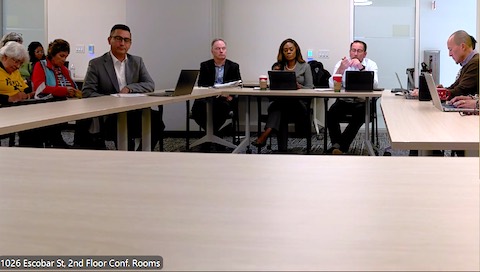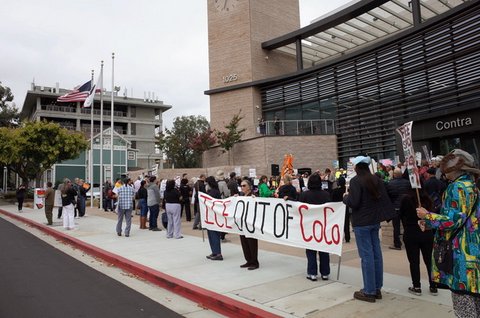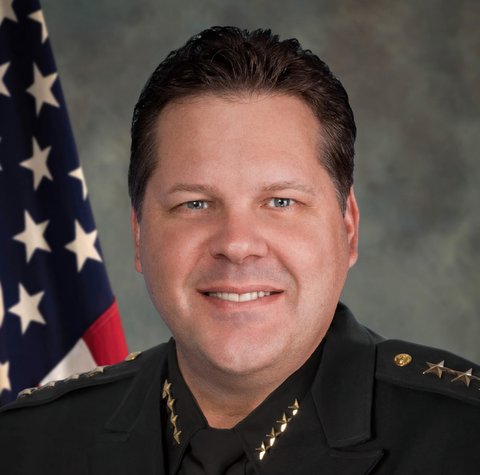
21 Nov County Non-Cooperation Policy with Immigration Authorities Stalls for Edits

The members of the Contra Costa County Equity Committee are Supervisors Shanelle Scales-Preston, center, and Ken Carlson, center right. (Screenshot captured by Samantha Kennedy / The CC Pulse)
By Samantha Kennedy
A policy that would prevent most Contra Costa County cooperation with immigration authorities hit a snag Monday after one official voiced concerns with contractor compliance and what he called “vague” data definitions.
Among other things, the proposed policy would prohibit the use of county funds or resources to collect information on someone’s citizenship or immigration status, unless necessary, or to assist immigration authorities, unless legally mandated.
The county Equity Committee stalled the policy to clear up definitions of data and rework contractor compliance with the non-cooperation policy and ordinance.
“Rather than finding some way to require compliance, [we could] provide notification of our policy and request compliance without any enforcement action available,” said Supervisor Ken Carlson, who chairs the committee. “I don’t want to put us in a position where we’re not able to, based on this, provide the services we need to provide.”
Carlson, who serves alongside Supervisor and Vice Chair Shanelle Scales-Preston, was the sole member who raised the concerns because of the variety of contracting processes the county goes through. Carlson said the requirement would be “exceptionally challenging” and proposed that contractors instead be asked to comply with the policy “as best as possible.”
Scales-Preston urged the proposal to keep “as much as possible” of the language for contractors. “It’s just another sheet in [the contract] that they’re going to follow,” she said.
The proposal comes months after the Board of Supervisors first referred the discussion to the committee following Contra Costa County Sheriff David Livingston’s refusal to stop cooperating with immigration agents.
The proposed policy and ordinance, as it stands, requires all contracts, leases and other agreements using county funds to uphold the protections set forth in the proposal. That would include subcontractors and employees while they’re performing duties as part of the agreement. It also says that the Sheriff’s Office must report its contact with immigration authorities at a Board of Supervisors meeting each month, unless the board is on recess for more than a month, and post it in the online Transparency Portal, which is under construction.
Exceptions to the policy and ordinance would have to be approved by supervisors, but Scales-Preston suggested that senior staffers of departments be allowed to instead make those exceptions.
Except in cases where a judicial warrant is provided or required under federal law, county staff and other employees would not be allowed to share immigration information with immigration agents. That includes additional restrictions on what the Sheriff’s Office can report to federal authorities.
Under SB 54, Livingston is legally allowed to share some information with federal immigration authorities when detainees are being held for select violent or serious felonies. But a non-cooperation policy or ordinance — or both, which are planned to be brought back to the committee — are legally allowed.
San Francisco, for example, has a non-cooperation policy.
But Livingston has told supervisors that, even if he was told to stop cooperating with immigration authorities like other local law enforcement agencies, he would continue.
Community members packed the room to urge members to send the proposal to supervisors without removing some of its power.
“County contracts have many requirements, and this ordinance is an important contribution to those contracts,” said Roxanne Carrillo Garza from Healthy Contra Costa. “Let’s not water it down by just saying we ‘encourage.’”
The committee is the last stop before the entire Board of Supervisors considers the proposal.
Even with the potential approval of a non-cooperation policy and ordinance, Scales-Preston said she doesn’t want to mislead communities.
“This [federal] administration is a different administration,” she said. “I have never seen an administration like this before, and it’s scary… I want community to stay vigilant.”
The committee’s next meeting is Dec. 15 at 10:30 a.m.






No Comments